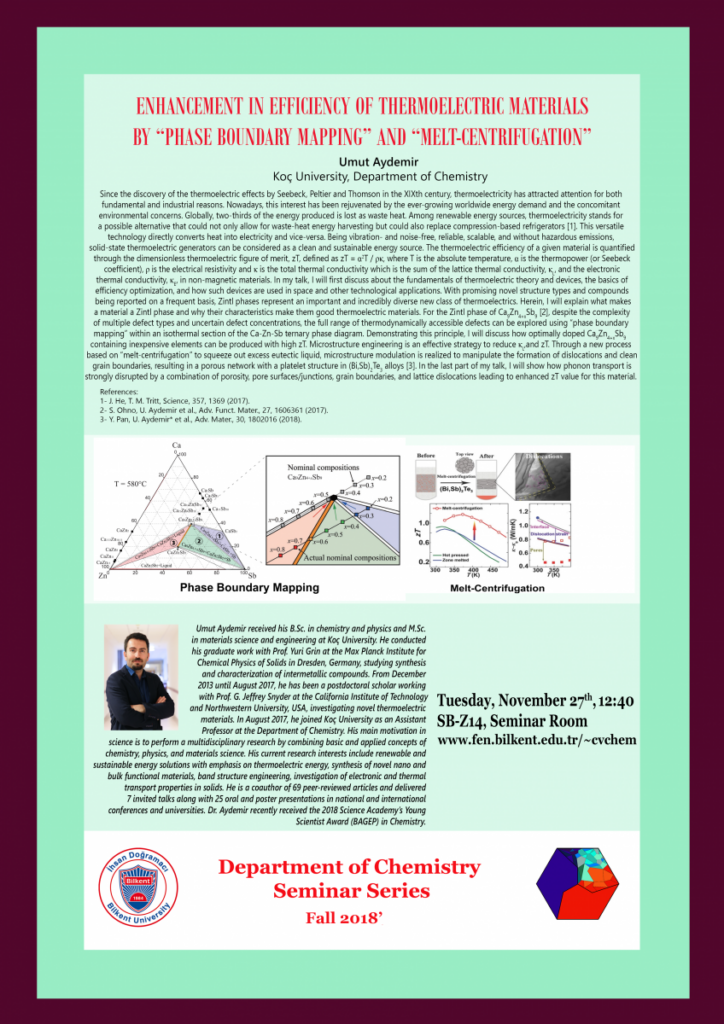Fall '18 Department Seminars with Dr. Umut Aydemir
Title: Enhancement in Efficiency of Thermoelectric Materials by “Phase Boundary Mapping” and “Melt-Centrifugation”
Speaker: Dr. Umut Aydemir
Department of Chemistry, Koc University
Istanbul, Türkiye
Date: November 27, 2018, Tuesday
Time: 12:40
Place: Departmental Seminar Room (SB-Z14)

Abstract:
Since the discovery of the thermoelectric effects by Seebeck, Peltier and Thomson in the XIXth century, thermoelectricity has attracted attention for both fundamental and industrial reasons. Nowadays, this interest has been rejuvenated by the ever-growing worldwide energy demand and the concomitant environmental concerns. Globally, two-thirds of the energy produced is lost as waste heat. Among renewable energy sources, thermoelectricity stands for a possible alternative that could not only allow for waste-heat energy harvesting but could also replace compression-based refrigerators [1]. This versatile technology directly converts heat into electricity and vice-versa. Being vibration- and noise-free, reliable, scalable, and without hazardous emissions, solid-state thermoelectric generators can be considered as a clean and sustainable energy source. The thermoelectric efficiency of a given material is quantified through the dimensionless thermoelectric figure of merit, zT, defined as zT = a1T / px, where T is the absolute temperature, a is the thermopower (or Seebeck coefficient), p is the electrical resistivity and x is the total thermal conductivity which is the sum of the lattice thermal conductivity, K, and the electronic thermal conductivity, K., in non-magnetic materials. In my talk, I will first discuss about the fundamentals of thermoelectric theory and devices, the basics of efficiency optimization, and how such devices are used in space and other technological applications. With promising novel structure types and compounds being reported on a frequent basis, Zintl phases represent an important and incredibly diverse new class of thermoelectrics. Herein, I will explain what makes a material a Zintl phase and why their characteristics make them good thermoelectric materials. For the Zintl phase of Ca,Zn,.,Sb, [2], despite the complexity of multiple defect types and uncertain defect concentrations, the full range of thermodynamically accessible defects can be explored using “phase boundary mapping” within an isothermal section of the Ca-Zn-Sb ternary phase diagram. Demonstrating this principle, I will discuss how optimally doped Ca.ZnSb, containing inexpensive elements can be produced with high zT. Microstructure engineering is an effective strategy to reduce x, and zT. Through a new process based on “melt-centrifugation” to squeeze out excess eutectic liquid, microstructure modulation is realized to manipulate the formation of dislocations and clean grain boundaries, resulting in a porous network with a platelet structure in (Bi,Sb), Te, alloys [3]. In the last part of my talk, I will show how phonon transport is strongly disrupted by a combination of porosity, pore surfaces/junctions, grain boundaries, and lattice dislocations leading to enhanced zT value for this material.
References:
1- J. He, T. M. Tritt, Science, 357, 1369 (2017).
2- S. Ohno, U. Aydemir et al., Adv. Funct. Mater., 27, 1606361 (2017).
3- Y. Pan, U. Aydemir* et al., Adv. Mater., 30, 1802016 (2018).
Short Biography of the Speaker:
Umut Aydemir received his B.Sc. in chemistry and physics and M.Sc. in materials science and engineering at Koç University. He conducted his graduate work with Prof. Yuri Grin at the Max Planck Institute for Chemical Physics of Solids in Dresden, Germany, studying synthesis and characterization of intermetallic compounds. From December 2013 until August 2017, he has been a postdoctoral scholar working with Prof. G. Jeffrey Snyder at the California Institute of Technology and Northwestern University, USA, investigating novel thermoelectric materials. In August 2017, he joined Koç University as an Assistant Professor at the Department of Chemistry. His main motivation in science is to perform a multidisciplinary research by combining basic and applied concepts of chemistry, physics, and materials science. His current research interests include renewable and sustainable energy solutions with emphasis on thermoelectric energy, synthesis of novel nano and bulk functional materials, band structure engineering, investigation of electronic and thermal transport properties in solids. He is a coauthor of 69 peer-reviewed articles and delivered 7 invited talks along with 25 oral and poster presentations in national and international conferences and universities. Dr. Aydemir recently received the 2018 Science Academy’s Young Scientist Award (BAGEP) in Chemistry.